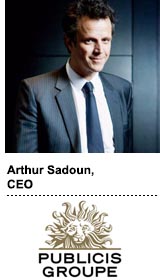
Publicis Groupe will divest part of its health care unit, Publicis Health Services (PHS), to restore its balance sheet and focus on the strategic growth areas of its business, the company announced Thursday.
PHS, which services contract sales organizations and doesn’t exist in other health care communications networks, has been a drag on the overall business.
Publicis’ Q3 organic revenue grew 1.3% to $2.5 billion, the holding company said Thursday. For the first nine months of 2018, organic growth inched up 0.2% to $7.5 billion. But with PHS excluded, the group would have grown 2.2% in Q3 and 0.8% in the first nine months of the year.
“We have taken a pragmatic approach to our cost portfolio assets,” CEO Arthur Sadoun said during the Publicis earnings call. “We are disposing assets that are not core and not aligned with our strategies. Our organic growth reflects our decision to classify Publicis Health Services as a noncore activity.”
Publicis has defined its strategic growth areas as data, dynamic creative and digital business transformation. By focusing on these services, which grew 27% in the first half of the year, the group won new business including Cathay Pacific, Mondelez and GSK.
New account wins contributed 100 basis points of growth in Q3 and should continue momentum into Q4, Sadoun said. Comvergence ranked Publicis Media first in new media business wins in the first half of the year.
“Account wins are a tangible demonstration of how our clients are responding positively to our model,” Sadoun said. “They make us confident about long-term trends and our ability to benefit from the major changes faced by our industry.”
While Publicis will continue divesting noncore assets, it will only do so for strategic purposes as opposed to beefing up its balance sheet.
“If we want to bring marketing and business transformation, we have to focus only on that,” Sadoun said.
Although the company will not make any major acquisitions soon, he said, it will continue to evaluate bolt-on acquisitions that bring either talent or technology that align with its strategy.
“We have seen buying growth at any price become an increasingly easy option for some competitors,” Sadoun said. “We have been extremely disciplined in making acquisitions, and we will be even more now that we have a clear plan. We won’t buy growth at unreasonable conditions that will hamper our relationship with clients in the long term.”
Creative pressure
Publicis bets that investments in data, technology and dynamic creative will mitigate some of the pressure that creative agencies face from reduced margins and scopes of work.
While clients are reducing spending on traditional creative, they’re not cutting budgets overall. Publicis is well positioned to capture that shift by emphasizing personalization at scale.
“The industry is facing structural headwinds on creative activities,” Sadoun said. “We are continuing to invest in data and technology to make our creative ideas even stronger and more effective.”
As Publicis incorporates data, technology and business transformation in more of its pitches, it’s also running into consulting firms. Consultants participated in the first round of the GSK pitch but were ultimately unsuccessful, said Steve King, CEO of Publicis Media.
“We are seeing competition occasionally, infrequently, from the consultancies,” he said. “I don’t know of a single instance where we’ve lost one of our major assignments, or any significant part, to any of the consultancies. The way we’re building our proposition will put us on an offensive footing.”
Consultants are, however, increasingly cropping up in business transformation pitches with Sapient, Sadoun added. “Although we are smaller, we have a proposal that is at least as competitive as we gain traction,” he said.
As for programmatic, Publicis has “huge momentum in that part of the business” despite a growing industry trend of clients taking pieces of the function in-house, King said.
“Compared to a year ago, we actually have a smaller proportion of clients in-housing,” he said. “One reason is because it’s really tough to do.”
And while media review activity is still heavy, the nature of pitches has changed from a cost perspective to a search for a strategic partner. Given that shift, clients will want to work with their agencies on a more long-term basis, King predicted.
“The solutions we’re building will give us more stickiness,” he said. “I think we will see an elongation of the pitch cycle.”
This post was syndicated from Ad Exchanger.


More Stories
Pead promotes talent from within
Baseball Announcer Called Out for Double Standard After Hitting on Women While On-Air
Thompson Spencer expands across the ditch